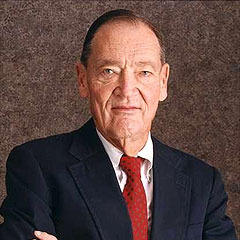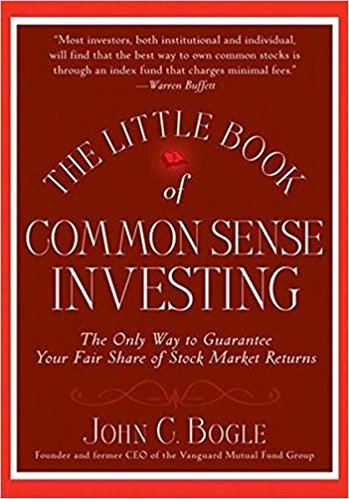DEFINITIVE The Little Book of Common Sense Investing Summary
5 min read ⌚
 The Only Way to Guarantee Your Fair Share of Stock Market Returns
The Only Way to Guarantee Your Fair Share of Stock Market Returns
John C. Bogle has the perfect stock tip for investors: Stop investing in any individual stocks. Diversify your portfolio, purchase an index fund and use the entire market.
If it sounds tempting to you, let’s begin discussing The Little Book of Common Sense Investing:
Who Should Read “The Little Book of Common Sense Investing”? And Why?
Supposedly, we already know the main reason that motivated Mr. Bogle to write this book. In fact, we have no clue.
Do you know why?
John C. Bogle spent his entire life serving the community. A lot of effort and energy was spent on social accountability because he wanted to give something in return.
What is the best way to win?
Train and be prepared. This book is intended for all people, in particular for individuals eager to learn the secrets of investment, and ready to apply them in their lives.
About John C. Bogle
 John C. Bogle was born in the late 20s or precisely on May 8th, 1929. He is an American-born investor, philanthropist, writer, and businessman who spent his childhood in Montclair, New Jersey.
John C. Bogle was born in the late 20s or precisely on May 8th, 1929. He is an American-born investor, philanthropist, writer, and businessman who spent his childhood in Montclair, New Jersey.
The Great Depression that took place in the 30s affected John in numerous ways; his parents were forced to sell their house, and they got divorced. The Economic crisis was the turning point in John’s life.
He used it to learn more about economics and investments. Later on, John C. Bogle became the creator and founder of the largest mutual fund in the entire world.
TIME has even named him as one of 100 most influential investors.
He is also the author of several bestsellers related to economics and investment.
“The Little Book of Common Sense Investing Summary”
Benjamin Graham represents the new age of investment; as one of the most astute capital managers, this book sounds like a real piece of investment treatise.
He refers to investors’ limited knowledge and questions their expertise in the realm of investment by underlying the lack of training they underwent. Economists and financial executives in global companies must be able to conclude profitable businesses based on momentarily stock offerings.
Graham even mentions: All shareholders have to know how to predict the variable value of stock and exchange rate for the benefit of the company.
Do you think today’s brokers have such an ability?
According to Graham, the society is dealing with economic crisis and dangerous policies that inflict conflicts causing lack of prosperity. World’s uncertainty brings us challenges that we can’t handle, thereby, the people are witnessing rivalries of a large scale.
Benjamin advises its readers to understand the economy and to remain persistently conservative in their stock related decisions.
As an investor, you should create a “defensive portfolio,” an excessively expanded selection of diversified stocks. He fiercely opposes the idea of purchasing and reselling stocks. If you want money, you should stick to the old long-term approach.
Graham warns investors and contradicts their habit to heavily rely on self-proclaimed brokers who make a fortune through trading commissions. These brokers’ financial interest is addressed only towards short-term investments; your long-term financial opportunities may vanish if you authorize them as your representatives.
The world’s largest fund company Vanguard Mutual Fund Group was founded by John C. Bogle (CEO and Chairman of the company at the time) – the author of “The Little Book of Common Sense Investing.”
In the 70s, he realized that by conceptualizing, it is possible to develop the first-ever index fund for any individual investor, and that is exactly what he did.
This breathtaking investment product created a domino effect, and gradually it revolutionized the marketplace. Dr. Paul Samuelson of M.I.T, declared- “The creation of the first world’s fundamental indexing fund by John Bogle is equally important as the invention of the alphabet and the wheel.”
Today’s worth speaks for itself, almost 1 trillion dollars are invested in index funds. If you are not convinced yet, you should listen to what investment genius like Warren Buffett, Nobel Laureates Samuelson, and Daniel Kahneman have to say and why according to them this is the most profitable approach that an investor could employ.
Despite Buffett’s opinion, Bogle also explains what index funds precisely do and how they can improve a person’s financial stability in this frazzled marketplace. A good book is composed of facts, well-researched material, and carefully explored ideas.
You know what they say: Invest in yourself, that is the best ROI you could ever get.
Key Lessons from “The Intelligent Investor”
1. Beat the time, be a decision-maker
2. Maintain a positive Saldo
3. Find the hidden costs
Beat the time, be a decision-maker
When you think of risk as an entity – beyond time (short/long term stocks) – American corporations have developed strong business basis.
Statistics express the investment process as a phrase in the U.S which refers to the “buy-and-hold method”.
American capitalism takes all the credit for that economic phenomenon and consequently, investors must think smart and be influential decision-makers.
Maintain a positive Saldo
Investors operating in stock markets rarely receive the overall ROI that they expect, lack of training and expertise in the area can lead to poor stock choices and increase the lost.
These officials must deal with management fees, sales loads, brokerage commissions, and still maintain a positive Saldo at the end of the day.
Find the hidden costs
Sometimes troubles occur because investors cannot assess the financial expenses that arise from investments.
Many hidden costs appear as soon as a purchase is being made, leading to disappointment and frustration. For instance, taxes on stock market profits.
Like this summary? We’d Like to invite you to download our free 12 min app, for more amazing summaries and audiobooks.
“The Little Book of Common Sense Investing” Quotes
The grim irony of investing, then, is that we investors as a group not only don't get what we pay for, we get precisely what we don't pay for. So if we pay for nothing, we get everything. Share on X The true investor . . . will do better if he forgets about the stock market and pays attention to his dividend returns and to the operating results of his companies. Share on X Time makes more converts than reason. Share on X The greatest Enemies of the Equity investor are Expenses and Emotions. Share on X When there are multiple solutions to a problem, choose the simplest one. Share on XOur Critical Review
Bogle‘s accomplishments give him the credibility to point some mistakes that we often make.
Bad decision-making was probably the only cause that inspired John to write this exceptional masterpiece. It doesn’t matter what your professional preferences are, what does matter is your ability to handle the stock market.
Undoubtedly, this book will give you the edge you desperately need to make your grand entrance in the stock market.
Emir is the Head of Marketing at 12min. In his spare time, he loves to meditate and play soccer.


 The Only Way to Guarantee Your Fair Share of Stock Market Returns
The Only Way to Guarantee Your Fair Share of Stock Market Returns




